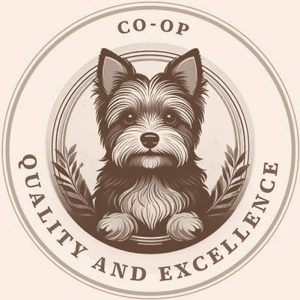Let’s compare breeder co-ops, the ASPCA, other rescue organizations, and the AKC, focusing on sustainability, ethics, local-based efforts, and economics, drawing on the provided sources linked in each section for you view yourself!
Breeder Co-ops:
• Purpose: Breeder co-ops are formed by groups of high-quality dog breeders who collaborate to uphold high standards, share resources, and make decisions as a collective. They are not pet shops or commercial breeders but rather a cooperative of hobby breeders. Their aim is to improve the quality of breeds and better connect with existing and prospective owners
• Sustainability: By focusing on responsible breeding practices and the well-being of dogs, breeder co-ops aim for a more sustainable model than mass breeding operations. They are often local and emphasize quality over quantity
• Ethics: Breeder co-ops prioritize greater accountability and care for both dogs and buyers. They ensure higher quality dogs and improved animal welfare compared to backyard breeders or entities with less oversight. Members have a shared goal of ethical breeding.
• Local-Based Efforts: Breeder co-ops are typically formed by local reputable breeders who share common goals. This inherently makes their efforts locally based, fostering relationships within a community of breeders and potential owners.
• Economics: These co-ops often provide shared marketing and visibility for responsible breeders, helping them connect with families who truly care. Economically, 100% of the purchase price goes directly to the individual breeder, as the cooperative is organized and operated by volunteer breeders for their benefit and the benefit of the dogs
ASPCA (American Society for the Prevention of Cruelty to Animals):
• Purpose: The ASPCA’s mission is to rescue, protect, and care for animals in need and to provide effective means for the prevention of cruelty to animals throughout the United States
• Sustainability: While aiming to help animals, concerns have been raised about the sustainability of their financial model, with a large portion of donations going to overhead and fundraising rather than direct aid to local shelters
• Ethics: The ASPCA has faced criticism regarding its spending, with reports of high executive salaries (CEO earning over $840,000 in 2019 and over $950,000 in 2020), significant amounts spent on fundraising, and the sale of donor lists. Some perceive their primary concern as money. Additionally, there are questions about whether their money goes where donors expect
• Local-Based Efforts: Despite its national presence, the ASPCA has no formal affiliation with local SPCAs. Many local SPCAs report receiving little to no funding from the ASPCA. While they offer grant opportunities, these are described as super specific and time-sensitive, not general support for local efforts. The majority of their hands-on animal services are in their headquarters in New York
• Economics: The ASPCA operates with a substantial budget and revenue. In 2019, only a small percentage of donations went to hands-on help for animals nationwide, and grants to local groups represent a small fraction of their total funds raised
Other Rescue Organizations:
• Purpose: These non-profit organizations are dedicated to re-homing animals and combating pet overpopulation. They can be species-specific or breed-specific
• Sustainability: The sustainability of rescue organizations varies greatly. Many rely on donations and can face financial struggles. Some may engage in transporting animals over long distances, raising concerns about health and logistics
• Ethics: While many rescues have good intentions, a lack of consistent regulation can lead to ethical issues. Concerns exist about transparency, with some rescues not disclosing behavioral issues of adopted animals or the source of the animals. Some have been accused of operating like pet shops for profit, even buying dogs at auctions. Reports of “dog trafficking” and prioritizing profit over animal welfare exist. Stringent and sometimes intrusive adoption requirements have also been noted
• Local-Based Efforts: Rescue organizations can be locally focused or involved in broader regional or even national transport efforts. The rise of transport rescues, bringing dogs from other states or countries, has been described as the “new pet store model” with potentially less regulation
• Economics: Funded primarily through donations and adoption fees. Adoption fees can be high, sometimes raising questions about the financial motives. Some rescues have been accused of profiting significantly under the guise of being non-profit
AKC (American Kennel Club):
• Purpose: The AKC is primarily a purebred dog registry organization. Despite once calling itself “the dog’s champion,” its actions suggest a focus on the interests of breeders and the registration of puppies
• Sustainability: The AKC’s sustainability is tied to the registration of a large number of puppies, incentivizing continued breeding
• Ethics: The AKC has been heavily criticized for opposing numerous bills aimed at protecting dogs, particularly those in puppy mills. They have been linked to breeders with documented issues of animal cruelty and poor conditions. The AKC’s “inspections” of breeders are often primarily paperwork reviews, not thorough humane inspections. Their opposition to the Puppy Protection Act and concerns over legislation preventing animal sexual abuse raise further ethical questions
• Local-Based Efforts: While the AKC has local-affiliated breeders and clubs, its legislative efforts and overall policies are national, often prioritizing the interests of breeders over broader animal welfare legislation
• Economics: The AKC’s income is derived from the registration of a staggering quantity of puppies. Their Marketplace website serves as a platform for breeders to advertise
Why the Breeder CO-OP Has the Advantage:
Based on the information, breeder co-ops potentially have several advantages in terms of sustainability, ethics, local-based efforts, and economics compared to the other three models:
• Sustainability: By focusing on quality and responsible breeding within a smaller, often local network, breeder co-ops aim for a more sustainable approach to dog breeding and ownership than mass breeding or the complexities of large-scale rescue transport. Their model emphasizes responsible practices which could lead to healthier dogs and fewer instances of surrender in the long run
• Ethics: The core principles of a breeder co-op revolve around upholding high standards and ensuring the well-being of dogs. This direct focus on ethical breeding practices and transparency within the cooperative structure can offer a higher level of ethical assurance compared to the ASPCA’s questioned spending and practices, the varied and sometimes concerning ethical issues within the broader rescue community, and the AKC’s documented opposition to animal welfare legislation to protect the puppy mill industry
• Local-Based Efforts: Breeder co-ops are inherently local, connecting local reputable breeders with potential owners in their community. This fosters a direct relationship and supports local ethical breeders, contrasting with the ASPCA’s national focus and limited direct local funding, the sometimes distant and large-scale operations of some rescue organizations, and the AKC’s national registry focus
• Economics: The economic model of a breeder co-op is designed to directly benefit the ethical breeders by providing shared resources and marketing while ensuring they receive the full purchase price of their puppies. This direct support for responsible breeders can be more economically sustainable for them than navigating the challenges of competing with less ethical breeders or facing the biases of the “adopt, don’t shop” movement. In contrast, the ASPCA’s large financial structure has raised questions about the efficient use of donor funds, some rescues have been accused of prioritizing financial gain over animal welfare, and the AKC’s economic model is based on high-volume puppy registration, which can inadvertently support less responsible breeding practices
It is important to note that the effectiveness and advantages of a breeder co-op depend on the specific organization and its members adhering to high ethical standards and truly prioritizing animal welfare. However, the structure itself offers a framework that, when properly implemented, can address some of the concerns raised about the other types of organizations.





























